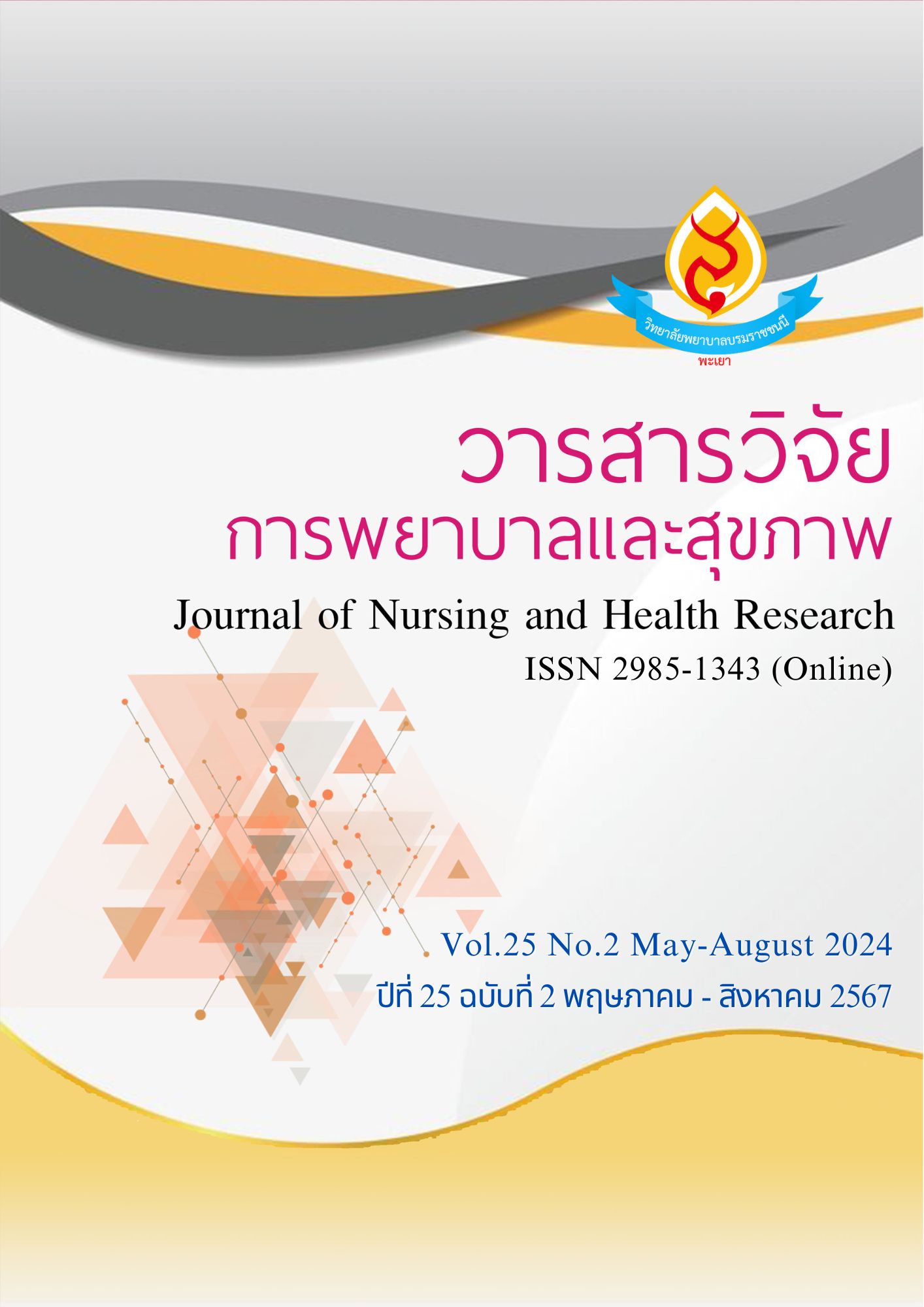ผลของการจัดการเรียนรู้โดยใช้กรณีศึกษาเป็นฐานต่อความสามารถในการแก้ปัญหาทางการพยาบาลของนักศึกษาพยาบาล
คำสำคัญ:
การจัดการเรียนรู้โดยใช้กรณีศึกษาเป็นฐาน, ความสามารถในการแก้ปัญหาทางการพยาบาล, นักศึกษาพยาบาลบทคัดย่อ
ความสามารถในการแก้ปัญหาทางการพยาบาลเป็นทักษะพื้นฐานสำคัญที่ต้องพัฒนาให้นักศึกษาพยาบาลเพื่อให้มีการคิดอย่างมีวิจารณญาณและความคิดสร้างสรรค์สามารถนำไปใช้ได้เมื่อสำเร็จการศึกษา การวิจัยกึ่งทดลองแบบหนึ่งกลุ่มวัดผลก่อนและหลัง มีวัตถุประสงค์เพื่อเปรียบเทียบคะแนนความสามารถในการแก้ปัญหาทางการพยาบาลก่อนและหลังการจัดการเรียนรู้โดยใช้กรณีศึกษาเป็นฐานในรายวิชาการพยาบาลผู้ใหญ่และผู้สูงอายุ 1 สำหรับนักศึกษาพยาบาล ชั้นปีที่ 2 วิทยาลัยพยาบาลบรมราชชนนี ชัยนาท จำนวน 107 คน เครื่องมือที่ใช้ในการวิจัย ประกอบด้วย แผนการเรียนรู้โดยใช้กรณีศึกษาเป็นฐาน กรณีศึกษา และคู่มือการจัดการเรียนการสอนโดยใช้กรณีศึกษาเป็นฐาน เครื่องมือที่ใช้ในการรวบรวมข้อมูลคือ แบบทดสอบอัตนัยประยุกต์ ทดสอบความเชื่อมั่นของเครื่องมือ ได้ค่าสัมประสิทธิ์แอลฟาของครอนบาคเท่ากับ .83 วิเคราะห์ข้อมูลโดยใช้สถิติพรรณนา และสถิติการทดสอบวิลคอกซัน ผลการวิจัย พบว่า นักศึกษาพยาบาลที่ได้รับการจัดการเรียนรู้โดยใช้กรณีศึกษาเป็นฐานมีคะแนนเฉลี่ยความสามารถในการแก้ปัญหาทางการพยาบาลหลังการทดลองสูงกว่าก่อนทดลองอย่างมีนัยสำคัญทางสถิติ (p<.001) ดังนั้น การจัดการเรียนการสอนควรมีการออกแบบการเรียนรู้โดยใช้กรณีศึกษาเป็นฐาน เพื่อให้นักศึกษาพยาบาลมีประสบการณ์ ในการแก้ปัญหาทางการพยาบาลในบริบทสถานการณ์ที่เป็นจริง การคิดอย่างมีวิจารณญาณ และความคิดสร้างสรรค์ ประสบความสำเร็จในการแก้ปัญหาเมื่อพบกับสถานการณ์ที่คล้ายคลึงกัน เพื่อนำไปใช้ในการปฏิบัติการพยาบาลที่ปลอดภัยและมีประสิทธิภาพ
เอกสารอ้างอิง
Chularee, S., Wijakkanalan, S., & Suwannoi, P. (2016). Blended learning model development promoting successful intelligence toward problem-solving planning in nursing. Journal of Education Khon Kaen University, 38(3), 114-125. (in Thai)
Boonkerd, M., Krabiad, S., Sungsri, P., & Tantisuwichwong, S. (2022). The integration between case-based learning and cloud technology to enhance problem solving skills among nursing students. Journal of Research Innovation and Evidence Based in Healthcare, 1(2), 54-61. (in Thai)
Jamjang, S., Atthamakul, W., Nilliaum, R., & Wongyara, N. (2021). The effects of simulation-based learning on problem-solving ability, and self-confidence in nursing care on the patient with health problems of nursing students. Journal of Prachomklao College of Nursing, Phetchaburi Province, 4(3), 178-194. (in Thai)
Kanhadilok, S., Punsumreang, T., & Malai, C. (2019). A design of cased learning for promoting learning outcomes in practicum. Songklanagarind Journal of Nursing, 39(4), 129-137. (in Thai)
Kusoom, W., & Hengyotmakt, A. (2019). The effects of cased learning on nursing students knowledge retention. Academic Journal Bangkokthonburi University, 8(1), 187-196. (in Thai) ttps://center. bkkthon.ac.th/journal/upload/doc/spit/22/files/187-196.pdf.
Lertwittayakul, T., & Pholputta, L. (2018). Using nursing process on clinical practicum of nursing student. College of Asian Scholar Journal, 8(2), 78-87. https://casjournal.cas.ac.th/admin/filedocuments/1545993219-8.2.10.pdf.
McLean SF. (2016). Case-based learning and its application in medical and health-care fields: A review of worldwide literature. Journal of Medical Education and Curricular Development, 3, 39-49.
Raksatham, S., & Wannasuntad, S. (2020). Effect of applying case-based learning through professional learning community on problem-solving skill of nursing students. Journal of Health and Nursing Research, 36(3), 220-232. (in Thai)
Rajchawail, N., Yotsurin, P., Tancharoen, P., Rearungchom, T., & Tomduangkaew, P. (2020). The evaluation of nursing process teaching by using case analysis and actual situation in hospital on the nursing care plan ability among the second-year nursing students of Boromarajonani College of Nursing Chiang Mai. Journal of Health Sciences Scholarship, 7(2), 76-90.
Tamsat, A. (2019. Development of activities for enhancing problem-solving skills in nursing dialogue analysis in computer-supported collaborative learning. [Doctor of Philosophy (Educational Research Methodology)]. Chulalongkorn University. (in Thai). https://digital.car.chula.ac.th/chulaetd/9556
Thailand Nursing and Midwifery Council. (2018). Core competencies of graduates with bachelor’s degree, master’s, doctoral degree in nursing science, advanced nursing training courses at the diploma level and receiving a certificate/approval letter. Demonstrate Knowledge and expertise in nursing and midwifery and nursing specialties in the field of nursing science. Nontaburi.
Thasaneesuwan, S., & Promlek, K. (2023). Nursing education to promote clinical reasoning skills: a case–based learning in adult nursing course. Journal of Research in Nursing – Midwifery and Health Sciences, 43(2), 132-142. (in Thai). https://he02.tci-thaijo.org/index.php/nur-psu/ article/ view/259302/180554.
Thoin, P., Khoyun, S., & Thipsungnean, T. (2021). Teaching nursing students to problem solving. Journal of Research and Curriculum Development, 11(1), 1-11. (in Thai)
Wichianrat, S., Kruttakart, S., Rungnoei, N., Traetulakarn, W., & Chakrabhand, S. (2018). Comparison of opinions regarding problem-solving skills among nursing students at Boromarajonani College of Nursing Changwat Nonthaburi. Journal of Nurses Association of Thailand Northern Region, 24(2), 96-107. (in Thai)
Williams, B. (2004). The implementation of case-based learning- shaping the pedagogy in ambulance education. Journal of Emergency Primary Health Care, 2(3-4), 1-7. (in Thai)
ดาวน์โหลด
เผยแพร่แล้ว
รูปแบบการอ้างอิง
ฉบับ
ประเภทบทความ
สัญญาอนุญาต
ลิขสิทธิ์ (c) 2024 วารสารวิจัยการพยาบาลและสุขภาพ

อนุญาตภายใต้เงื่อนไข Creative Commons Attribution-NonCommercial-NoDerivatives 4.0 International License.



